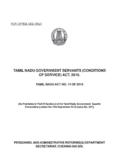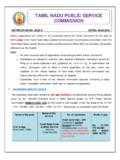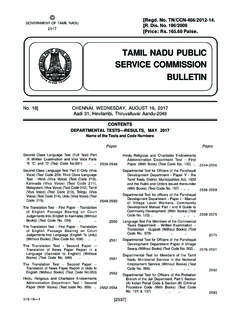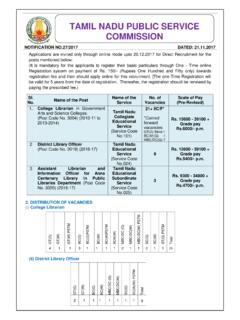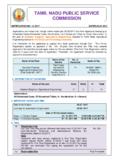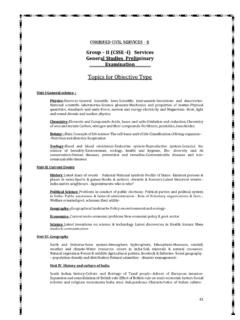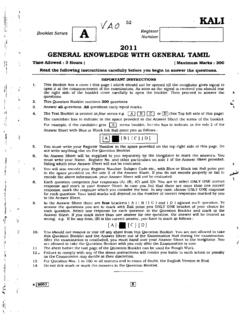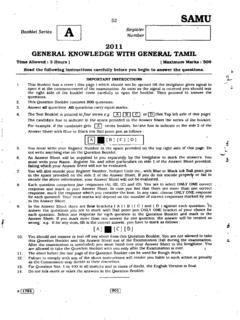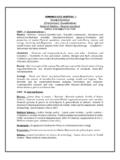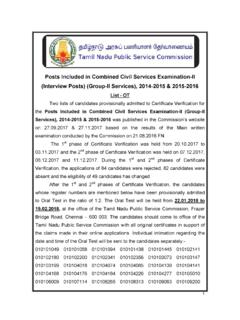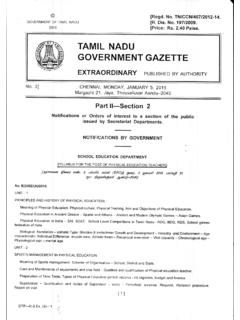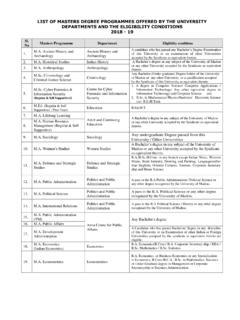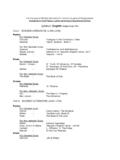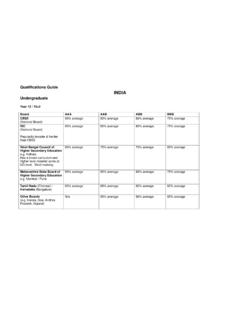Transcription of COMBINED CIVIL SERVICES - I Group I Services …
1 COMBINED CIVIL SERVICES -IGroup I SERVICES ( preliminary examination ) general studies degree standardTOPICS FOR OBJECTIVE TYPEUNIT I:GeneralSciencePhysics Universe general Scientific laws Scientific instruments Inventions anddiscoveries National scientific laboratories Science glossary Mechanics andproperties of matter Physical quantities, standards and units Force, motion andenergy electricity and Magnetism electronics & communications Heat, light andsound Atomic and nuclear physics Solid State Physics Spectroscopy Geophysics Astronomy and space Elements and Compounds Acids, bases and salts Oxidation andreduction Chemistry of ores and metals Carbon, nitrogen and their compounds Fertilizers, pesticides.
2 Insecticides Biochemistry and biotechnology Electrochemistry Polymers and Main Concepts of life science The cell basic unit of life Classification of livingorganism Nutrition and dietetics Respiration Excretion of metabolic waste Bio Blood and blood circulation Endocrine system Reproductive system Genetics the science of heredity Environment, ecology, health and hygiene, Bio diversity and its conservation Human diseases, prevention and remedies Communicable diseases and non communicable diseases Alcoholism and drugabuse Animals, plants and human II:Current EventsHistory-Latest diary of events National National symbols Profile of States Defence, national security and terrorism World organizations pacts and summits Eminent persons & places in news Sports & games Books & authors Awards &Honours Cultural panorama Latest historical events India and its neighbours Latestterminology Appointments who is who?
3 PoliticalScience-India s foreign policy Latest courtverdicts public opinion Problems in conduct of public elections Political parties and political system in India Public awareness & general administration Role of Voluntary organizations & Govt., Welfare oriented govt. schemes, their landmarks Policy on environment and Current socio economic problems New economic policy & Govt. Latest inventions on science & technology Latest discoveries in HealthScience Mass media & III:Geography Earth and Universe Solar system Atmospherehydrosphere, lithosphere Monsoon, rainfall, weather and climate Water resources rivers in India Soil, minerals & natural resources Natural vegetation Forest &wildlife Agricultural pattern, livestock & fisheries Transport & communication Socialgeography population density and distribution Natural calamities disastermanagement Climate change impact and consequences mitigation measures Pollution IV.
4 History and culture of India-Pre historic events Indus valleycivilization Vedic, Aryan and Sangam age Maurya dynasty Buddhism and Jainism Guptas, Delhi Sultans, Mughals and Marathas Age of Vijayanagaram and thebahmanis South Indian history Culture and Heritage of Tamil people Advent ofEuropean invasion Expansion and consolidation of British rule Effect of British ruleon socio economic factors Social reforms and religious movements India sinceindependence Characteristics of Indian culture Unity in diversity race, colour,language, custom India as secular state Organizations for fine arts, dance, drama,music Growth of rationalist, Dravidian movement in TN Political parties and populistschemes Prominent personalities in the various spheres Arts, Science, literatureand Philosophy Mother Teresa, Swami Vivekananda, Pandit Ravishankar , , Rukmani Arundel and V.
5 INDIAN POLITY Constitution of India Preamble to the constitution Salient features of constitution Union, State and territory Citizenship rights amendduties Fundamental rights Fundamental duties Human rights charter Unionlegislature Parliament State executive State Legislature assembly Status ofJammu & Kashmir Local government panchayat raj Tamil Nadu Judiciary inIndia Rule of law/Due process of law Indian federalism center state relations Emergency provisions CIVIL SERVICES in India Administrative challenges in a welfarestate Complexities of district administration Elections Election Commission Unionand State Official language and Schedule VIII Amendments to constitution Schedules to constitution Administrative reforms & tribunals Corruption in publiclife Anti corruption measures Central
6 Vigilance Commission, lok adalats,Ombudsman, Comptroller and Auditor general of India. Right to information Central andState Commission Empowerment of women Voluntary organizationsand public grievances redressal Consumer protection VI:INDIAN ECONOMY Nature of Indian economy Five year planmodels an assessment Land reforms & agriculture Application of science inagriculture Industrial growth Capital formation and investment Role of publicsector & disinvestment Development of infrastructure National income Publicfinance & fiscal policy Price policy & public distribution Banking, money &monetary policy Role of Foreign Direct Investment (FDI) WTO globalization &privatization Rural welfare oriented programmes Social sector problems population, education, health, employment, poverty HRD sustainable economicgrowth Economic trends in Tamil Nadu Energy Different sources and development Finance Commission Planning Commission National Development VII.
7 INDIAN NATIONAL MOVEMENT National renaissance Earlyuprisingagainst British rule 1857 Revolt Indian National Congress Emergence of nationalleaders Gandhi, Nehru, Tagore, Netaji Growth of militant movements Differentmodes of agitations Era of different Acts & Pacts World war & final phase struggle Communalism led to partition Role of Tamil Nadu in freedom struggle Rajaji, VOC,Periyar, Bharathiar & Others Birth of political parties /political system in India VIII:APTITUDE & MENTAL ABILITY TEST Conversion of information todata Collection, compilation and presentation of data Tables, graphs, diagrams Parametric representation of data Analytical interpretation of data Simplification Percentage Highest Common Factor (HCF) Lowest Common Multiple (LCM) Ratioand Proportion Simple interest Compound interest Area Volume Time and Work Behavioral ability Basic terms, Communications in information technology Application of Information and Communication Technology (ICT) Decision makingand problem Reasoning.
8 Puzzles Dice Visual Reasoning Alpha numeric Reasoning Number Series Logical Number/Alphabetical/Diagrammatic CIVIL SERVICES -IGroup I SERVICES (Main examination )PAPER I general studies ( degree Standard)Topics for Descriptive typeUNIT-I:Modern history of India and Indian culture Advent of Europeaninvasion Expansion and consolidation of British rule Effect of British rule onsocio economic factors Social reforms and religious movements India sinceindependence Characteristics of Indian culture Unity in diversity race, colour,language, custom India a secular state Organizations for fine arts, dance, drama,music Growth of rationalist, Dravidian movement in Tamil Nadu Political partiesand populist schemes National renaissance Early uprising against British rule 1857 Revolt IndianNational Congress Emergence of national leaders Gandhi,Nehru, Tagore.
9 Netaji Growth of militant movements Different modes of agitations Era of different Acts & Pacts World war & final phase struggle Communalism led topartition Role of Tamil Nadu in freedom struggle Rajaji, VOC, Periyar, Bharathiar & : general Aptitude & Mental Ability-Conversion of information to data Collection, compilation and presentation of data Tables, graphs, diagrams Parametric representation of data Analytical interpretation of data Percentage Highest Common Factor (HCF) Lowest Common Multiple (LCM) Ratio andProportion Simple interest Compound interest Area Volume Time and Work Probability Information technology Basic terms, Communications Application ofInformation and Communication Technology (ICT) Decision making and problemsolving Basics in Computers / Computer 3.
10 Role and impact of science and technology in the development of Indiaand Tamil Nadu-Nature of universe general scientific laws Scientific instruments Inventions and discoveries National scientific laboratories Science glossary Physical quantities, standards and units Mechanics and properties of matter Force,motion and energy Heat, light and sound Magnetism, electricity and electronics Atomic and nuclear physics Astronomy and space science Elements andcompounds Acids, bases and salts Oxidation and reduction Carbon, nitrogen andtheir compounds Natural disasters safeguard measures Chemistry of ores andmetals Fertilizers, pesticides, insecticides Biochemistry and biotechnology Polymers and plastics Electrochemistry Main concepts of life science The cell basic unit of life Classification of living organism Nutrition and dietetics Respiration Excretion of metabolic waste Bio communication Blood and bloodcirculation Endocrine system Reproductive system Animals, plants and human life Govt.
